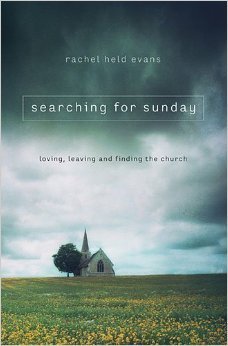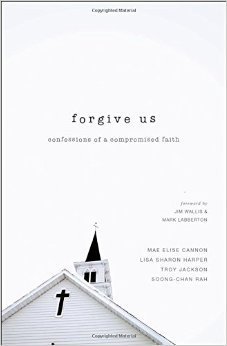Rachel Held Evans's Blog, page 9
March 15, 2015
Updated Spring Speaking Schedule (My Home Church + Lancaster)

Our home church is a beautiful place to worship!
I’ve updated my spring speaking schedule to include my home church, St. Luke’s Episcopal Church in Cleveland, Tennessee, where I’ll be delivering the Sunday morning homily on Sunday, March 22 at the 8:00, 9:30, and 10:45 a.m. services. I have been overwhelmed by the love this congregation has shown us over the last year, and it’s an honor to be asked to speak at a place that feels like home and among people I consider family. If you’re from the area and want to say hello, please join us. You are always welcome! Learn more here.
I’ve also noted that the event with the Parish Resource Center in Lancaster, Pennsylvania on April 18 will serve as something of a book launch party for Searching for Sunday, which releases that week. In fact, a copy of the book is included in the price of the ticket, and I’ll be hanging around afterwards to sign and to talk. Should be lots of fun. Learn more here.
Check out the rest of the spring schedule for events in Dallas TX, Columbus OH, Little Rock AR, and Princeton, NJ. Look for the fall schedule to appear soon.


March 13, 2015
Strong Enough to Be Self-Critical: In America and the church
![[Participants, some carrying American flags, marching in the civil rights march from Selma to Montgomery, Alabama in 1965] (LOC) from Flickr via Wylio](https://i.gr-assets.com/images/S/compressed.photo.goodreads.com/hostedimages/1426363884i/14006464._SX540_.jpg)
© 1999 The Library of Congress, Flickr | PD | via Wylio
I’m over at the CNN Belief Blog today with a post about how we don’t have to choose between loving the church and criticizing it:
"You would have to be made of stone to not be moved by President Obama's address on the 50th anniversary of the march on Selma last Saturday. His tribute to the "plain and humble people...coming together to shape their country's course" was poetic and principled, timely and true -- a fitting way to honor those who marched in support of voting rights in 1965.
But perhaps the most striking lines from this historic speech concerned the inherent patriotism of righteous protest:
"What greater expression of faith in the American experiment than this, what greater form of patriotism is there than the belief that America is not yet finished, that we are strong enough to be self-critical, that each successive generation can look upon our imperfections and decide that it is in our power to remake this nation to more closely align with our highest ideals?"
The President has faced criticism in recent months for acknowledging that American history, and indeed Christian history, includes racism, violence, injustice, and oppression -- particularly against minority and indigenous people -- a reality some would rather sweep under the rug. Former New York City Mayor Rudy Giuliani went so far as to say the President doesn't love America because he "apologizes" for it so often.
It is common for those invested in preserving the status quo to try and silence those working for reform by suggesting that allegiance to a country or family or faith demands total acquiescence, that you can't love something and be critical of it at the same time.
This happens not only in politics, but also in religion…"
[Read the rest here.]


March 10, 2015
Searching for Sunday Excerpt: "Table"
On Tuesdays, between now and April 14, I’ll be sharing excerpts from my new book, Searching for Sunday: Loving, Leaving, and Finding the Church. The book is arranged around seven sacraments—baptism, confession, communion, holy orders, confirmation, anointing of the sick, and marriage—and today’s excerpt comes from the communion section and a chapter entitled “Open Table.” It’s also the first of four video excerpts in a series produced by Daniel Evans and Jason Erickson. (Note: The video includes closed captioning.)
Pre-order Searching for Sunday here.


March 4, 2015
But it’s not about race…right?
Today the Justice Department released a report showing that between 2012 and 2014, police in Ferguson, Missouri used force almost exclusively on its black residents.
But it’s not about race….right?
Though a third of Ferguson residents are white, blacks accounted for 85 percent of traffic stops, 90 percent of tickets and 93 percent of arrests.
But it’s not about race…right?
The report found that a black driver who was pulled over was twice as likely to be searched by police as a white driver, even though searches of white drivers were more likely to turn up drugs or illegal weapons.
But it’s not about race... right?
In an email, a Ferguson city official predicted that President Obama would not retain his office long because “what black man holds a steady job for years?”
But it’s not about race...right?
Another email suggested that a good way to curb crime would be for black women to have abortions. Another included a cartoon depicting African Americans as monkeys.
But it’s not about race...right?
In cases like jaywalking, and other minor discretionary offenses, blacks accounted for 95 percent of all arrests. When whites were charged with these crimes, they were 68 percent more likely to have their cases dismissed.
But it’s not about race... right?
Of those jailed for more than two days, 95% were black.
…But it’s not about race, right?
The people of Ferguson knew for years what the Justice Department report finally concluded—that the Ferguson Police Department routinely violated the constitutional rights of its black residents. These findings reflect national trends in which African American men are incarcerated at nearly six times the rate of whites. And even though five times as many white people use drugs in this country as African Americans, the latter are ten times more likely to be arrested for drug offenses.
It is about race.
The justice system is broken, skewed in favor of the wealthy and the white. And if the stories of our black friends, family, and neighbors aren’t enough to convince the doubters, then maybe the numbers will.
The protest in the wake of the Michael Brown shooting didn’t emerge from a vacuum, but from a community and a culture that routinely oppresses people of color. I don’t know much about racial reconciliation—I’m still listening, learning, and making mistakes—but I know that followers of Jesus don’t have the luxury of glossing over inequity or idealizing American history, not when our Teacher was himself executed by an unjust system. We have to face our collective failings head-on. Only then can the process of reconciliation begin.
***
Be sure to check out The New Jim Crow: Mass Incarceration in the Age of Colorblindness by Michelle Alexander. See also “The Cops See It Differently,” Part 1 and Part 2 on This American Life and “Not As Helpless as We Think: 3 Ways to Stand in Solidarity with Ferguson.”]


March 3, 2015
Searching for Sunday Excerpt: "Going First"

© 2010 Bs0u10e0, Flickr | CC-BY-SA | via Wylio
On Tuesdays, between now and April 14, I’ll be sharing excerpts from my new book, Searching for Sunday: Loving, Leaving, and Finding the Church. The book is arranged around seven sacraments—baptism, confession, communion, holy orders, confirmation, anointing of the sick, and marriage—and today’s excerpt comes from the Holy Orders section in a chapter entitled "Epic Fail."
"It’s strange that Christians so rarely talk about failure when we claim to follow a guy whose three-year ministry was cut short by his crucifixion. Stranger still is our fascination with so-called celebrity pastors whose personhood we flatten out and consume like the faces in the tabloid aisle. But as nearly every denomination in the United States faces declining membership and waning influence, Christians may need to get used to the idea of measuring significance by something other than money, fame, and power. No one ever said the fruit of the Spirit is relevance or impact or even revival. The fruit of the Spirit is love, joy, peace, patience, kindness, goodness, faithfulness, gentleness, and self-control—the sort of stuff that, let’s face it, doesn’t always sell.
I often wonder if the role of the clergy in this age is not to dispense information or guard the prestige of their authority, but rather to go first, to volunteer the truth about their sins, their dreams, their failures, and their fears in order to free others to do the same. Such an approach may repel the masses looking for easy answers from flawless leaders, but I think it might make more disciples of Jesus, and I think it might make healthier, happier pastors.
There is a difference, after all, between preaching success and preaching resurrection. Our path is the muddier one."
Pre-order Searching for Sunday here. And check out this Pinterest board I made, which includes images that inspired me as I was writing the book and to which I'll be adding additional quotes and resources over the next few weeks.


February 28, 2015
“Strength and Dignity Are Her Clothing”: Making Ethical Fashion Choices (by Leah Wise)

Nomads Peacock Dip Hem fair trade tunic via Style Wise.
Today I’m thrilled to share a guest post on an important topic from a very smart and creative person. Leah Wise manages an Episcopal thrift shop by day and crafts posts for her fair trade blog, Style Wise, by night. She received her degree in Religious Studies from Florida State University and lives with her grad student husband in Charlottesville, VA. When not thinking about ethical fashion, she enjoys singing in her church choir and grabbing midweek drinks with friends.
It’s hard to find a style blog that prioritizes ethical buying, so it’s a joy to have found Leah’s. Today she explains why ethical buying is important and provides some practical ideas for how to do it. Enjoy!
***

(Cheetah print from People Tree)
In 2011, I was working at a prominent, Christian-owned craft store (you know the one) when I began to see a real disconnect in the way American Christians practice Christian ethics.
Christian elevator music wafted through the sales floor, store teams were encouraged to open in prayer each morning, and the home décor section featured wall art portraying noble bald eagles soaring above verses from Psalms. Corporate prided itself in donating thousands of dollars to charity every year. I'll never forget the time a woman with a thick Texas accent told me that her home school organization had received a large sum of money from the company the year before. But I couldn't help but notice, on nights when I straightened the shelves or on truck days as I unloaded products from pallets, that something wasn’t adding up. Turn nearly any item in the store over and you’d see it: “Made in China.”
Then he will answer them, “Truly I tell you, just as you did not do it to one of the least of these, you did not do it to me.” – Matthew 25:45
What I couldn’t wrap my head around was this: How can a company that espouses Christian values also support sweatshop labor? The natural next question for me was, "How can I claim to live like Christ if I continue to buy into labor practices that exploit and dehumanize the poor?"
The fact of the matter is that the global manufacturing system is broken. In the cutthroat world of retail, consumer demand for low prices paired with increasing raw materials costs means companies are eager to cut costs in the only place with a bit of wiggle room: labor. And it’s easy enough to do because, as people in developing countries leave failing farmland to work in the cities, demand for manufacturing jobs increases, creating fertile ground for exploitation. Laborers take what they can get, ultimately being cornered into wage slavery by distant corporations who pretend not to know what they’re buying into. In the best case scenario, entire families go to work and barely scrape by. In the worst case scenario, such as the tragedy at Rana Plaza on April 24, 2013, over a thousand people die when their workplace collapses.
How does God’s love abide in anyone who has the world’s goods and sees a brother or sister in need and yet refuses help? – 1 John 3:17
It’s natural to shake our heads and thank our lucky stars that we live in countries that attempt to prevent these types of human rights abuses, but we must not let those initial feelings of pity mixed with personal relief assuage our guilt or distract us from our complicity in the system. No one deserves to live in constant fear that they will not be able to eat. No one should be forced by lack of options to work in a facility that could very well collapse, toppling an entire community in the blink of an eye. No one should ever have to sacrifice themselves in the name of cheap garments sold to apathetic consumers (not to mention the fact that our “first world” societies still manage to fail thousands of their own in this regard).
Religion that is pure and undefiled before God, the Father, is this: to care for orphans and widows in their distress, and to keep oneself unstained by the world. – James 1:27
We have a duty as Christians to protect the poor, the widowed, and the orphan by demanding manufacturing transparency and redirecting our spending to companies and organizations that treat people with the dignity they deserve. Our collective voice is strong enough to topple the tower we’ve built in the name of consumerism.
But that doesn’t mean it will be easy. Labor rights issues are broad and complex, and we can’t always be certain that a small change in our consumer habits will improve the industry. But that’s no excuse not to try. We may be limited by our financial situations or by a lack of diversity in the fair trade market, but, if we start with a step, it’s quite possible we’ll gain the momentum and the perspective to keep on walking.
Where to begin? There are several options:
Shop secondhand.Thanks in part to the Recession, thrift shopping is on the rise (there’s a silver lining for you). Goodwill stores are everywhere and there's bound to be a community or church thrift shop in your area, as well. Shopping secondhand reduces demand for new goods while offering an economical alternative to fair trade.
Buy products from companies with transparent supply chains.In response to the demands of socially conscious consumers, many companies are latching onto Corporate Social Responsibility Standards that outline their labor auditing practices, but it’s important to get as many specific details as possible since regulations are only helpful if they’re followed. Companies like Everlane provide detailed information on their factories and their costs so that consumers can make an informed decision before purchasing. In a similar vein, avoid companies that make no mention of their manufacturing practices or are known to have unsatisfactory auditing practices (for example, Gap Inc.).
Buy fair trade.
Chevron crossbody bag by Manos Zapotecas via Style Wise.
Fair Trade, according to the World Fair Trade Organization, is "a trading partnership, based on dialogue, transparency and respect, that seeks greater equity in international trade. It contributes to sustainable development by offering better trading conditions to, and securing the rights of, marginalized producers and workers – especially in the South." Umbrella organizations like the World Fair Trade Organization are effective because they offer external auditing, which helps to ensure reports are generated for the benefit of laborers rather than company interests.
Retailers like Ten Thousand Villages establish partnerships with small scale artisans around the world in order to provide living wages to those with the greatest need while supplying consumers with unique products.
The fair trade market is growing rapidly and it's becoming much easier to find practical items that you can be sure were produced with regard for worker welfare.
Change your frame of mind.Fair labor means higher prices. This is a given. You can't buy as much as often if you're buying through ethical channels, and that's okay. Buy secondhand when you can and save up for higher priced goods from ethical retailers. Be patient with yourself and others. You can't change everything in a day. Make changes where you can and know you're doing it because it matters, because it is part of your calling.
Strength and dignity are her clothing,
and she laughs at the time to come. – Proverbs 31:25
It’s important to remember that human lives are at stake here. Fair trade cannot be a trend or a novelty. People matter, and those of us who stand in positions of privilege must hold ourselves accountable for the ways we continue to profit at the expense of those who do not.
I encourage you to stay focused, make small changes, and do your part so that all God’s children can flourish.
***
Please do not hesitate to reach out to Leah if you have any questions or need help finding a particular ethical product. You can find additional information on her fair trade fashion blog. And check out these additional resources:
World Fair Trade Organization
Good Guide
Fair Trade Federation
Ecouterre
The Ghosts of Rana Plaza


February 26, 2015
Join the ‘Searching for Sunday’ Launch Team!

Well, we’ve entered that season of the writing/publishing cycle when it’s time to do some publicity. Most authors struggle with this stage of the process, and I’m no different. Urging readers to pick up your book feels a lot like sending out a résumé or auditioning for a play or selling grapefruit door to door for your high school marching band trip to London (which is way harder than it sounds, by the way).
But this time around I feel buoyed by the fact that I’m working with a great group of people at Thomas Nelson and I’ve never believed in a creative project more than I believe in Searching for Sunday. I’m proud of this book. I put my very best into it. And I hope it will be as healing to those who read it as it was for me as I was writing it.
A good way to get quotes, reviews, images and articles to those who actually want to see them without inundating my social media channels is to form a launch team. We did this with A Year of Biblical Womanhood and it was a huge success. So we’re opening it up again for Searching for Sunday.
As a member of the launch team, you will get:
• a complimentary advance reader's copy of Searching for Sunday
• access to an exclusive Facebook group for discussion, collaboration, access to the author and publicity ideas and resources
• behind-the scenes-participation in a national book launch
• my eternal gratitude
You'll be expected to:
• read the book
• participate in the launch team Facebook group
• write an honest review of the book on Amazon or Barnes & Noble during launch week (April 13-19)
• spread the word via social networking, word of mouth, or those airplanes that pull banner ads through the sky over the beach
If more than 300 people apply, the team at Thomas Nelson will make a selection based on their own criteria. Spots are open for the next 24-hours!
Apply HereThanks ahead of time for your interest and support! I’m grateful for it every day.


February 24, 2015
Searching for Sunday Excerpt: "The Labyrinth"

© 2012 wplynn, Flickr | CC-BY-ND | via Wylio
On Tuesdays, between now and April 14, I’ll be sharing excerpts from my new book, Searching for Sunday: Loving, Leaving, and Finding the Church. The book is arranged around seven sacraments—baptism, confession, communion, holy orders, confirmation, anointing of the sick, and marriage—and today’s excerpt comes from the confirmation section and a chapter entitled “Wayside Shrines."
"The difference between a labyrinth and a maze is that a labyrinth has no dead ends.
The famed eleven-circuit labyrinth inlaid in the floor of Chartres Cathedral in France has just one path, which takes the pilgrim in and out of four quadrants in a spiraling motion through dozens of left and right turns, before reaching its rosette center. Such a pattern invites meditation, the mystics say, and reminds the pilgrim that the journey of faith is rarely a straightforward one.
It has become cliché to talk about faith as a journey, and yet the metaphor holds. Scripture doesn’t speak of people who found God. Scripture speaks of people who walked with God. This is a keep-moving, one-foot-in-front-of-the-other, who-knows-what’s-next deal, and you never exactly arrive. I don’t know if the path’s all drawn out ahead of time, or if it corkscrews with each step like Alice’s Wonderland, or if, as some like to say, we make the road by walking, but I believe the journey is more labyrinth than maze. No step taken in faith is wasted, not by a God who makes all things new."
Pre-order Searching for Sunday here. And check out this Pinterest board I made, which includes images that inspired me as I was writing the book and to which I'll be adding additional quotes and resources over the next few weeks.


February 17, 2015
40 Ideas for Lent 2015

© 2009 peter castleton, Flickr | CC-BY | via Wylio
As has become a tradition here on the blog, I’ve compiled a list of 40 ideas that I hope will help you make the most of this season of reflection, penitence, and preparation. Some ideas are repeats from previous years, while others are new. Please feel free to add your own ideas and recommendations in the comment section.
5 Questions to Ask Yourself:1. When I wake up on Resurrection Sunday morning, how will I be different? What am I preparing for?
2. Is there something in my life—a habit, a grudge, a fear, a prejudice, an addiction, an emotional barrier, a form of excess—that keeps me from loving God with my heart, soul, mind, and strength and loving my neighbor as myself? How might I address that over the next 40 days?
3. Lent is a time to listen to God, but sometimes God speaks through others, particularly the poor, oppressed, marginalized, and suffering. To whom should I be listening this season? How can I cultivate a listening posture toward others whose perspective and experiences might differ from my own?
4. Is there a spiritual discipline—praying the hours, lectio divina, the examen—that I’ve always wanted to try? How might I alter my daily routine to include one of these disciplines?
5. The cycle of death and resurrection is central to the Christian faith. In what ways is that cycle present in my life right now? Where might there be necessary change, suffering, death and decay, and how might new life emerge from those experiences?
10 Prayers & Meditations1. Psalm 51
2. Psalm 139
3. Isaiah 58
5. Litany of Penitence (adapted by Richard Beck from the Book of Common Prayer)
6. “Listening Prayer,” from Forgive Us: Confessions of a Compromised Faith:
Be silent.
Plant both feet on the floor.
Breathe.
Listen to God’s words to you about the real people whose cries God hears every day…people who cry out in every corner of the world; whether that corner is peppered with steeples, temples, mosques, or synagogues.
Listen to God’s heart for them.
Listen…Can you hear their cries?
7. “Blessing the Dust” by Jan Richardson
8. Prayer for Christians Facing Persecution, Church of England:
“O Lord God, your Son Jesus Christ suffered and died for us. In his resurrection he restores life and peace in all creation. Comfort, we pray, all victims of intolerance and those oppressed by their fellow humans. Remember in your kingdom those who have died. Lead the oppressors towards compassion and give hope to the suffering. Through the same Jesus Christ our Lord. Amen.”
9. Confession of Sin (Presbyterian Mission Agency, Resources on Cultural Diversity and Racism):
Gracious God,
in Jesus Christ you teach us to love our neighbors,
but we build dividing walls of hostility.
You show us how to love one another as sisters and brothers
but we hide ourselves from our own human family.
You ask us to seek out the stranger and welcome the guest,
but we lock ourselves up inside our own fear.
You want us to share your abundant gifts with the poor,
but we cling tightly to our possessions and our privilege.
You call us to proclaim good news to all people,
but we waste our words and hide our light.
Have mercy on us, loving God.
Forgive our sin, open our hearts, and change our lives.
By your Spirit, make us holy and whole—
one people, united in faith, hope, and love;
through Jesus Christ, our reconciler and redeemer.
10. “I Want Jesus To Walk With Me”
15 Fasts & Disciplines
1. Practice the prayer of examen each day. This daily spiritual discipline (credited to St. Ignatius of Loyola) invites the participant to concentrate on the experiences of the past 24-hours through four prayerful stages: presence, gratitude, review, and response. Mars Hill Bible Church has a helpful guide here, and A New Liturgy just released a series of songs, prayers, and Scripture around the examen. (For more ideas and variations on the traditional examen, check out Ignatian Spirituality.)
2. Traditionally, Christians abstained from eating meat during Lent, so consider joining millions of Christians around the world in this fast. It’s a great way to connect with the historical, worldwide church and to become more mindful about the food you eat.
3. For families with children: Make a thorn wreath with your family or Institute a Way of Light wreath or an Easter Tree (via Ann Voskamp) You may also want to check out this fantastic list of Lent ideas for families, which includes eating fish sticks on Fridays, making paper chains, donating, and keeping a gratitude jar.

4. Do a personal or group study around Forgive Us: Confessions of a Compromised Faith by Soong-Chan Rah, Mae Elise Cannon, Lisa Sharon Harper, and Troy Jackson This powerful book provides historical information, reflection, and prayers around Christian complicity in sins against God’s creation, indigenous people, African Americans and people of color, women, the LGBTQ community, immigrants, Jews and Muslims. (Read my review, and an interview with the authors here.) Not only is this book informative, it’s also practical, providing well-written prayers of confession and lament (appropriate for both personal and corporate use) as well as ideas for repairing relationships and pursuing justice.
5. Pray the offices for 40 days. The Daily Office, or the Divine Hours, consists of four times of prayer each day: morning prayers (Matins/Laudes), midday prayers (Sext), evening prayers (Vespers), nighttime prayers (Compline). If it’s your first time praying the hours, I recommend using Phyllis Tickle’s The Divine Hours, Pocket Edition.
6. Recent news has brought the plight of persecuted Christians from around the world back into our collective consciousness. Consider devoting a few minutes each day, for 40 days, to learning about and praying for our brothers and sisters suffering for their faith. For ideas, check out Open Doors and Voice of the Martyrs. You may want to begin by praying specifically for the families of the 21 Coptic Christians recently executed in Egypt. Here are the names of those killed:
Milad Makin Zaki
Abanub Ayyad Atiyah
Majid Sulayman Shihatah
Yusuf Shukri Yunan
Carlos Bushra Fawzi
Bishoy Astafnus Kamil
(brother) Suma'ili Astafnus Kamil
Malak Ibrahim Sanyut
Tawadaros Yusuf Tawadaros
Jirjis Milad Sanyut
Mina Sayyid Aziz
Hani Abd-al-Masih Salib
Bishoy Adil Khalaf
Samuel Alham Wilson
Izzat Bushra Nasif
Luqa Najati Wanis
Isam Bidar Samir
Malak Farraj Abram
Samih Salah Faruq
Jabir Munir Adli
7. Make or purchase Anglican Prayer Beads and devote yourself to praying through them three times a day.
8. Go on a mini-pilgrimage. Set aside a day (or even a weekend) during Lent to visit a nearby monastery. A couple years ago, I spent a weekend at St. Bernard Abbey in Cullman, Alabama, and it was a really enriching time for me. I especially enjoyed walking through their outdoor stations of the cross. Many monasteries welcome overnight guests and allow them to participate in prayers and meals. Just be sure to call ahead to make a reservation and learn about the community’s policies. Or, visit a church that has a labyrinth and walk the labyrinth, or a church that has a unique work of art you have always wanted to see.
9. Get creative with what you “give up.” A few years ago, I gave up sleeping in for Lent and found that fast surprisingly challenging and meaningful. I committed to rising just before dawn each day to pray, which not only broke my night-owl habits but also turned my heart and mind to the significance of the pre-dawn dark in the death and resurrection cycle. As Barbara Brown Taylor says: “…New life starts in the dark. Whether it is a seed in the ground, a baby in the womb, or Jesus in the tomb, it starts in the dark.” I learned a lot in those quiet, dark moments.
Other things you might want to consider “giving up”: social media, cynicism (replace with wonder, compassion, and hope), perfectionism, legalism, TV, sugar, reading authors and bloggers who tend to look and think like you, comparison, etc. One fast that has crossed my mind this week is the idea of giving up the consumption of people for Lent. Our culture (through social media, reality TV, celebrity gossip, etc.) has so profoundly commodified people—actual human beings— it’s become a phenomenon we hardly even notice anymore. Only recently have I been contemplating the significance of this trend, catching myself in the act of commodifying and consuming other people and also experiencing the pain of being commodified and consumed myself. I’m not exactly sure what “giving it up” would look like, but I’d like to try.
10. Join me in reading Falling Upward: Spirituality for the Two Halves of Life by Richard Rohr.
10 Resources1. Calvin Institute of Christian Worship: Songs For Lent
2. Sybil MacBeth’s Lenten Calendar Templates for 2015
3. Wondrous Encounters: Scriptures for Lent by Richard Rohr
4. “A Lent Where #BlackLivesMatter: 10 Ideas for Black History Month and the White Church” by David Henson
5. The Lent Project, Biola University
6. Resources for Celebrating Lent with Kids
7. “Lent: For Your Penance” by Enuma Okoro
8. A Place at the Table: 40 Days of Solidarity with the Poor by Chris Seay
9. Eastertide: Prayers for Lent Through Easter by Phyllis Tickle
***
See also:
40 Ideas for Lent 2013
40 Ideas for Lent 2012
40 Ideas for Lent 2011
40 Ideas for
Lent 2010


February 16, 2015
See you in Nashville!

I’ll be in Nashville this week, on the campus of Trevecca Nazarene University, Thursday, February 19. I’ll be speaking about my “year of biblical womanhood” in chapel at 9:30 a.m. and reading/speaking from my new book, Searching for Sunday, at 7:00 p.m. Both events are free and open to the public. Let me know if I will see you there.


Rachel Held Evans's Blog
- Rachel Held Evans's profile
- 1710 followers



